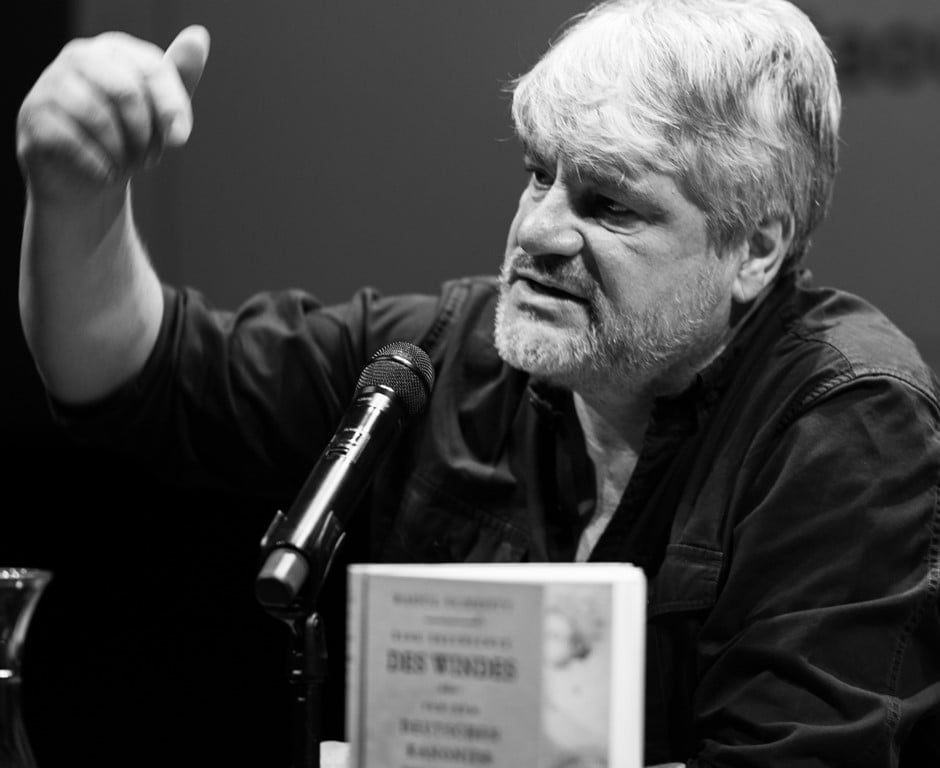
Raoul Schrott
- Austria
- Zu Gast beim ilb: 2011, 2017, 2018, 2019
Raoul Schrott was born in 1964. He grew up in Tirol, Tunis, and Zürich, and studied languages and literature in Norwich, Paris, and Berlin. From 1986 until 1987, he was the secretary to Philippe Soupault in Paris. He wrote his doctoral dissertation on »Dada 1921−1922« and in 1998 he earned his professorship credentials in poetry at the Institute for Comparative Literature in Innsbruck. His 1997 anthology »Die Erfindung der Poesie« (tr: The Invention of Poetry) explores the development of European poetry over four thousand years.
His literary oeuvre encompasses various genres. Between 1995 and 2015 he published the novels »Finis Terrae«, the fictional travelogue of an archaeologist, »Tristan da Cunha«, named after an island in the southern Atlantic which serves as a place of longing, the short story »Khamsin«, the novella »Die Wüste Lop Nor« (tr: The Lop Nor Desert), »Das Schweigende Kind« (tr: The Silent Child), as well as the poetry collections »Hotels«, »Tropen. Über das Erhabene«, »Weissbuch. Über das Heilige«, and »Die Kunst an nichts zu glauben«. In his collection of essays, »Handbuch der Wolkenputzerei« (2005; tr: Manual for Cleaning Clouds), Schrott proves himself to not only be a theorist of poetic craftsmanship but also a critic of the feuilleton where »a dialectic of mere tastes is exercised which eagerly ignores the actual work.« In fact, Schrott has most frequently been criticized for his translations – such as the epic of »Gilgamesh« (2001) − which led to impassioned debates with his critics. From 2005 until 2008, he worked on a new translation of »The Illiad«; in 2007 he published his much-discussed theses on Homer and Troy in »Homers Heimat. Über die realen Hintergründe des troianischen Krieges« (tr: Homer’s Native Country. The Real Reasons for the Trojan War). Published in 2011, »Gehirn und Gedicht« (tr: Brain and Poetry), Schrott’s collaboration with the neuroscientist Arthur Jacobs, explores the cognitive basis of literary forms of expression. »Erste Erde. Epos« (2016; tr: First Earth. Epic Poem) reviews our current state of knowledge, ranging from the Big Bang to the creation of the earth, life, and humankind. The result is a magnificent narrative panorama that focuses on our ethics and a modern view of humankind. On the basis of journeys to the sites where the evolution of the universe can be read and the life stories of individual figures – researchers, scientists, artists – Schrott creates a large narrative panorama in which the question of our ethical location and a modern image of man is central. In »Eine Geschichte des Windes oder Von dem deutschen Kanonier der erstmals die Welt umrundete und dann ein zweites und ein drittes Mal« (2019; tr: A Story of the Wind, or of the German Gunner Who Circumnavigated the World for the First Time and then a Second and a Third Time), Schrott dedicates himself to a minor figure in world history, Hannes from Aachen, and his multiple attempts to circumnavigate the globe, during which he became entangled in mutinies, shipwrecks, and adventures.
Raoul Schrott is the recipient of numerous awards, among them the Prize of the State of Carinthia as part of the Ingeborg Bachmann Prize competition, the Berlin Literature Prize, the Peter Huchel Prize for Poetry, the City of Mainz Stadtschreiber Literaturpreis and the Joseph Breitbach Prize. He lives in Austria.
Die Erfindung der Poesie
Gedichte aus den ersten viertausend Jahren
[als Hg.]
Eichborn
Frankfurt a. M., 1997
Tristan da Cunha oder Die Hälfte der Erde
Hanser
München/Wien, 2015
Die Kunst an nichts zu glauben
Hanser
München/Wien, 2005
Homer, Ilias
[als Ü.]
Hanser
München, 2008
Erste Erde. Epos
Hanser
München, 2016
Politiken & Ideen
Hanser
München, 2018
Eine Geschichte des Windes oder Von dem deutschen Kanonier der erstmals die Erde umrundete und dann ein zweites und drittes Mal
Hanser
München, 2019
